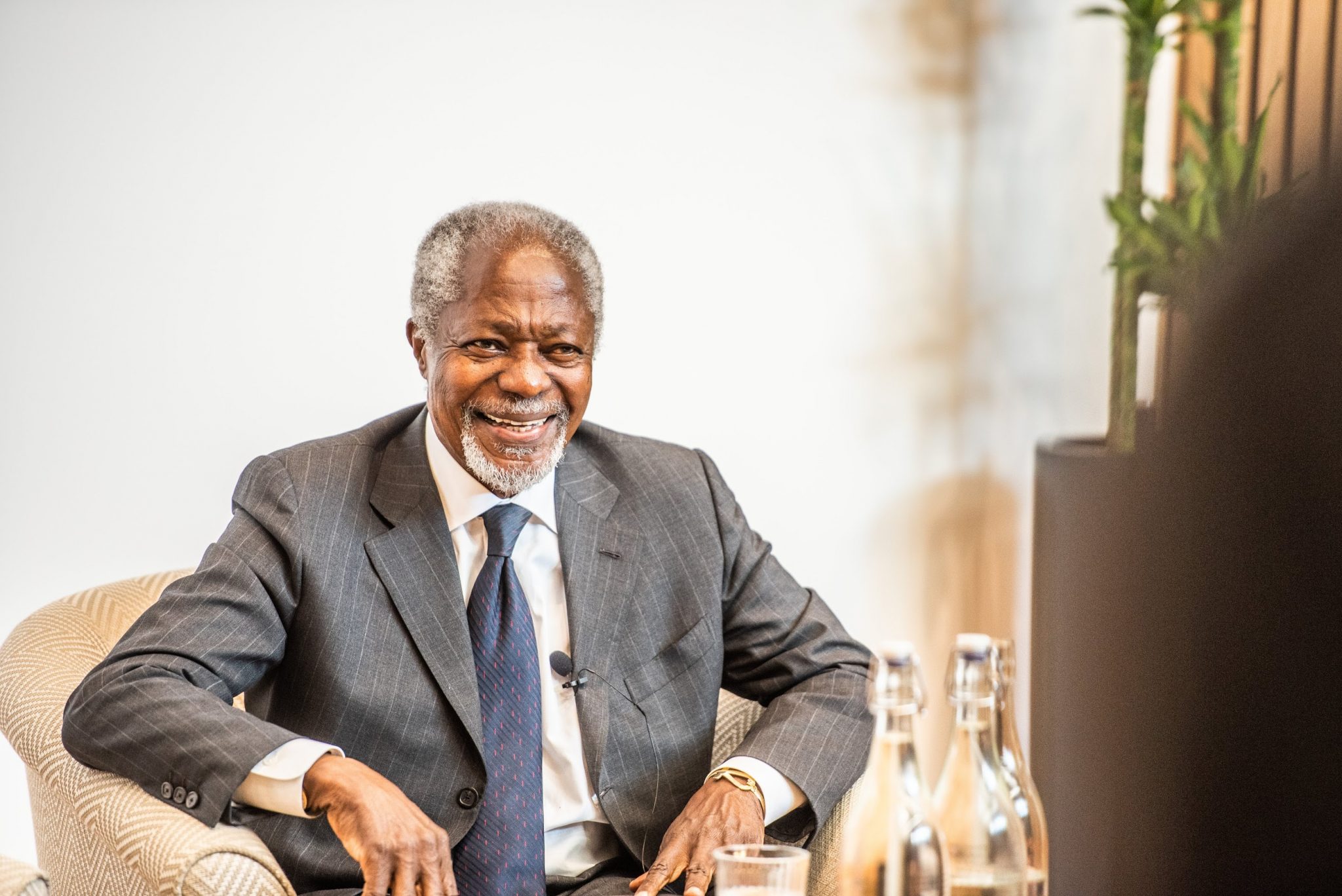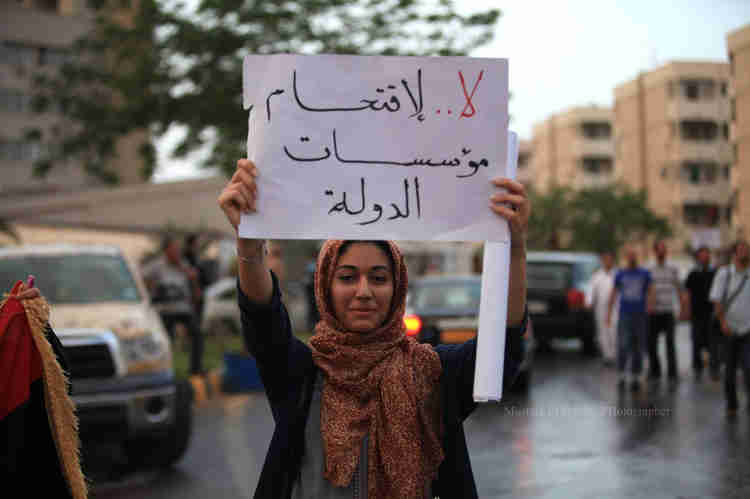Kofi Annan : Lessons in Futility
Kofi Annan’s existential crisis during his decade as United Nations Secretary General was without question related to the US-led invasion of Iraq. But the most fascinating part of his new memoir, “Interventions: A Life in War and Peace,” is the account of his numerous attempts to nudge the world toward a Middle East peace deal.
In both cases, the soft-spoken diplomat does little to disguise his blunt and courageous message: that in both cases, he could only look on as Washington aggressively and without apology became the world’s biggest security threat.
Yes, yes, of course: the United States is the world’s lone superpower, the biggest UN dues payer, a country that fancies itself a selfless promoter of democracy and a powerful moral force in a wicked world. It is a veto-wielding permanent member of the Security Council, the UN body in charge of maintaining international peace and security.
But during George W. Bush‘s eight-year stay in the White House, which began five years into Annan’s move to the UN’s 38th-floor executive offices, Washington launched an illegal invasion on false pretenses and then bungled the postwar occupation, sucking Iraq into nearly a decade of sectarian violence, civil chaos, torture, official corruption and regional instability.
In the Middle East, the US turned its back on the festering Israeli-Palestinian conflict as a series of mini-wars unrolled, involving Israel, Gaza, Lebanon and the militant group Hezbollah. When it finally paid a little attention, the US reacted tepidly and with callous indifference to all but Israel, to which it essentially outsourced its foreign policy even as this approach undermined America’s own publicly stated goals.
The diplomatic history of this period is well documented, but it’s worth going over again from Annan’s perspective. In his view, he sought repeatedly to give a helping hand to an uninformed, poorly advised Bush. But the US leader typically resented Annan’s advice and ran down a different path, often with alarming international consequences.
Annan, a Ghanaian, started at the UN as a numbers guy (among his first big jobs he served as budget director and controller) and later moved into peacekeeping. In 1997, he became the UN’s seventh secretary-general, serving two five-year terms before stepping down at the end of 2006. It was the US government that plucked him from the bureaucracy after blackballing Boutros Boutros-Ghali of Egypt for a chance at a second term as the UN’s top official.
While conservatives have long distrusted the UN as a threat to US sovereignty, Bush seemed happy enough with Annan until after Sept. 11, 2001. UN officials and member nations grew queasy over Bush’s ultimatum to world governments that “you’re either with us, or against us” in Washington’s new global war on terror.
Soon, Bush was in a big hurry to mount a pre-emptive invasion of Iraq based on faulty intelligence, even as Annan was publicly and privately trying to slow things down. Bush ultimately punished Annan for his actions in a way that nearly tore the UN apart.
While Bush insisted he wanted to invade Iraq to retaliate for its presumed cache of weapons of mass destruction, the rest of the world pretty much figured out he meant to topple an unlovable strongman and seize control of Baghdad’s oil reserves.
Whatever his motivations, Bush invaded in March 2003 despite the Security Council’s refusal to give the war a green light. In September 2004, Annan called the attack “illegal” and a violation of the UN Charter, infuriating any American who hadn’t been paying attention until then.
The secretary-general was vindicated when no weapons of mass destruction turned up and a sadly mismanaged US occupation aggravated sectarian rivalries and left Iraq a wreck.
“By behaving the way it did, the United States invited the perception among many in the world – including many longtime allies – that it was becoming a greater threat to global security than anything Saddam could muster,” Annan concludes. “For Washington to allow this evolution in its global position was not only a historic failure of diplomacy but also a tragedy for the rule of law around the world.”
Annan paid a terrible price for his courage. Washington forced an independent investigation of the UN-operated Iraqi oil for food program that turned up waste, fraud, routine kickbacks to Iraq and widespread mismanagement along with official corruption. Many governments and private interests shared the blame, but the UN had been in charge.
Annan was even more gravely embarrassed when it was discovered that the UN program director, Benon Sevan, had pocketed Iraqi bribes. Worse, Sevan fled the US for exile in his native Cyprus to avoid prosecution.
Sadder still, in what Annan calls a “deeply painful” moment, investigators found that his son Kojo had been on the payroll of a Swiss firm named Cotecna when it won a big UN contract to inspect humanitarian goods entering Iraq. Annan had concluded there was no conflict of interest in the award after his son assured him he was no longer working for Cotecna.
Soon, members of the US Congress were calling on Annan to resign; others said Washington should defund the UN. It was a full-fledged US campaign to “delegitimize” the world body, Annan writes.
Ultimately, Bush pulled back. Annan recounts Bill Clinton telling him in a phone call about “an extraordinary conversation” the former US leader had just finished with Bush.
“You do not want Kofi Annan’s blood on your hands,” Clinton said he warned Bush. “Bush’s reply was revealing: ‘My right-wingers want to destroy the United Nations, but I don’t.’ ”
Maybe he did and maybe he didn’t. Nonetheless, Annan concludes that “statesmanship prevailed and Washington slowly realized the need for the organization to regain its indispensable role in international security.”
Yet that has not been the case in the Middle East.
The UN General Assembly played a crucial role in the early days of the regional crisis, voting in November 1947 to partition the Palestinian territory into separate countries for Arabs and Jews. But the Jews unilaterally declared a state and named it Israel, forcing a mass Palestinian emigration, and Arab states went to war. Efforts have been made to find peace ever since, but before Annan, the UN was pretty much stuck on the sidelines.
Worried by the instability created by this endless conflict and knowing he could not count on the parties to make progress on their own, Annan proposed developing a major-power mechanism to help push things along from the outside. He assembled a quartet of international mediators, including the UN, the European Union, Russia and the US. This would at last give the UN a seat at the negotiating table.
But whenever something positive occurred in the region, a Palestinian group opposed to conciliation would mount a lethal attack on an Israeli target and Israel would back away, saying it could not work with terrorists.
Annan recognized that this reaction handed control of the situation to militants intent on blocking peace. So he had the quartet draft a road map to peace that he could monitor. The route consisted of a series of obligations for each party to meet, step by step, following a timetable and regardless of distractions like suicide bombings.
The Palestinians’ first obligation was to end terror attacks, while Israel was to freeze its settlement activities. Europe and Russia were pleased to sign on to the plan, which could have led to real results had Bush worked to pursue it as well. Instead, Washington put its name on the press release as Bush let it be known that his heart wasn’t in it, and Israel responded by quickly issuing 14 reservations to the road map, gutting it before it could get moving.
In contrast to its haste in Iraq, Annan writes, the US “had proved it was simply unwilling to push forward in the manner that we were.”
As to Bush’s attitude toward the Middle East conflict in general, he says, “I was taken aback by just how hands-off he chose to be.”
At one point, he recounts, Javier Solana, the European foreign policy czar, approached Bush, seated at Annan’s side at a UN luncheon, to suggest that he take the opportunity to shake Yasser Arafat’s hand. “Tell him to shake his own hand,” Bush responded.
Another time, Annan suggested that Bush name Bill Clinton, an avid champion of Middle East peace during his White House years, as his special envoy in the region, “thinking that Bush could claim credit for any success while distancing himself from any failure.”
“Thank you for that good advice,” Bush said, which Annan took as an “unambiguous no.”
When Israel announced its withdrawal from Gaza, Annan saw this as a fresh opportunity to create momentum toward a peace deal again. But at the last minute, “the Americans took over the process and tilted the framework toward the Israelis.”
He added, “I witnessed once again the unhealthy possessiveness that Washington has over the Arab-Israeli peace process, and its reluctance to share it meaningfully with others – even those working toward the same ends.”
In a related Mideast arena, Washington began a campaign in 2004 in the Security Council to break Syria’s grip on Lebanon. Because of its strategic location and importance, a free and democratic Lebanon would have been an extraordinary achievement for the UN as well as for the US and its Western allies. But Annan feared the move could also damage the UN because of the widespread perception of a double standard in the council’s determination to drive Syria out of Lebanon, compared to “its passivity regarding Israel’s occupation of Arab land.”
Amazingly, Syria agreed to withdraw. But then the Lebanese prime minister, Rafiq Hariri, was assassinated in a Beirut bombing widely blamed on Damascus. A wave of other bombings followed that have yet to be solved. Hezbollah, at the time closely tied to Syria, then attacked an Israeli patrol across Lebanon’s southern border and seized two hostages.
Soon, Israel and Hezbollah were at war, inflicting heavy damage on civilian areas in much of Lebanon and northern Israel. While Lebanon and most world governments worked with Annan to end the fighting as quickly as possible, Washington sought to string it out to leave Israel enough time to achieve its stated goal of destroying Hezbollah.
The war lasted 34 days before a cease-fire took hold as the battle achieved pretty much the opposite of what Israel and the US wanted.
Near the end of the fighting, as the Security Council hashed out the text of the cease-fire resolution, Israel pleaded for more time to safely move its troops into defensive positions and swore off any more offensive actions. Instead, it used the next three days to carpet parts of Lebanon with cluster bombs that continued killing and maiming civilians long afterward.
When the smoke cleared, Hezbollah bragged that it had emerged from the fighting essentially unscathed. Thousands of Lebanese and Israeli civilians died, and both Israel and the US were tarnished in the eyes of the world. The government in Lebanon that Washington had hoped to bolster crumbled, enabling Hezbollah to gain veto power in the country’s cabinet.
Annan’s frustration jumps off the pages of his book. He had tried in vain, he says, to dissuade the Security Council from calling only for an “immediate” cut-off of hostilities. He wanted the council to insert into the cease-fire resolution a fixed date for fighting to end. But Bush’s UN ambassador at the time, John Bolton, “who for all his bravado had never been responsible for a single soldier in his life, ignored this advice.”
Annan jumped back into the struggle when the militant Hamas movement won 2006 Palestinian elections. Bush viewed himself as a missionary of democracy, and Washington had championed free and fair Palestinian elections – until Hamas won. Israel rejected the result and the Bush administration fell in line behind it.
But with Hamas sending what he perceived as mixed signals, Annan suggested that the quartet could try to use the situation to encourage Hamas to begin to soften its hard-line position.
Israel and Washington had ruled out working with Hamas unless it first recognized Israel, renounced violence and accepted existing Palestinian agreements and obligations. Annan thought that Hamas could be convinced to accept at least one or two of these conditions if the UN and other countries – like Europe or Russia – held out the possibility of limited cooperation with the militant group. But Condoleezza Rice, the US secretary of state at the time, insisted it was all or nothing and blocked a quartet meeting on the matter.
Although Annan felt it was crucial to maintain a viable Palestinian Authority as a political alternative to Hamas, the Americans seemed unconcerned, he writes. Top quartet diplomats “warned me that the United States’ aim was to bring about the collapse of the Palestinian Authority and Hamas with it.” The Palestinians split in two, however, with Hamas running Gaza and the Palestinian Authority nominally in charge of those parts of the West Bank unoccupied by Israeli settlements.
Though the quartet still exists, issuing occasional statements, it has had little to no effect on the peace process. Barack Obama found himself outmaneuvered by Israeli Prime Minister Benjamin Netanyahu in his own attempt at peacekeeping, and a fresh initiative does not appear to be on the agenda of Annan’s successor Ban Ki-moon.
“The only winners to emerge from this litany of failures,” Annan concludes, “have been those who seek to perpetuate the conflict – militants and radicals, whether they fire rockets at or launch suicide bombs into Israeli towns, or subjugate Palestinians in the West Bank while taking their land.”
So now we know how tough it is to be secretary-general, particularly when you do not have the US on your side. Annan also uses his book to discuss such challenges as genocide in Rwanda and ethnic cleansing in Kosovo and Sudan.
But he also acknowledges some of his own achievements, including his work to define a new UN approach to Africa, spur development and economic growth worldwide and promote the Responsibility to Protect, a doctrine that dictates international intervention when a country’s civilians come under attack from their own leaders, a tool used to justify NATO’s air attack on Libya last year.
To his own credit, Annan, who is 74 years old, uses the book to discuss his own failings. His closing wish is for the eventual acheivement of “a United Nations that serves not only states but also peoples, and becomes the forum by which leaders are held accoutable for their behaviour towards their own citizens.”



